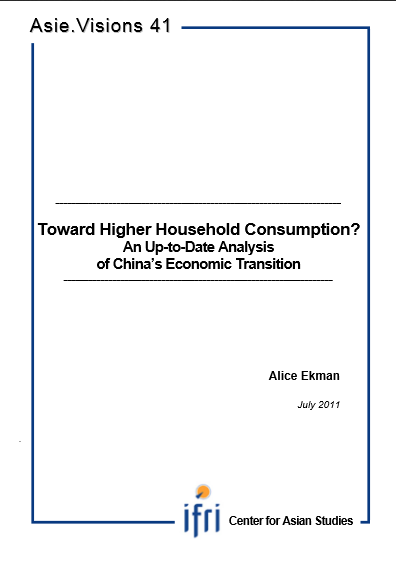Toward Higher Household Consumption? An Up-to-Date Analysis of China's Economic Transition

For more than two decades, China's economy has been growing at an average rate of close to 10 percent. As a result of this stellar performance, China ascended to the rank of the world's second largest economy in 2010, surpassing Japan.
Despite these remarkably high figures, the share of consumption in China's total expenditure has been low. China's economy relies much more heavily on exports and fixed government investments. If China continues on the same path, economic growth would not only become more vulnerable but also unsustainable.
In order to achieve sustainable growth, China needs to rebalance its economy to rely more on domestic consumers. The 12th Five-Year Plan, approved in March 2011, is designed to facilitate this shift by putting in place several large scale measures, including the improvement of the social safety net.
But transforming the nation's growth model will take time and effort. There are significant obstacles to boosting domestic consumption - such as low household income for instance - that government measures may be unable to effectively bypass.
This paper presents these current obstacles in detail and assesses the responses proposed by the 12th Five-Year Plan.

Available in:
ISBN / ISSN
Share
Download the full analysis
This page contains only a summary of our work. If you would like to have access to all the information from our research on the subject, you can download the full version in PDF format.
Toward Higher Household Consumption? An Up-to-Date Analysis of China's Economic Transition
Related centers and programs
Discover our other research centers and programsFind out more
Discover all our analyses
RAMSES 2024. A World to Be Remade
For its 42nd edition, RAMSES 2024 identifies three major challenges for 2024.
France and the Philippines should anchor their maritime partnership
With shared interests in promoting international law and sustainable development, France and the Philippines should strengthen their maritime cooperation in the Indo-Pacific. Through bilateral agreements, expanded joint exercises and the exchange of best practices, both nations can enhance maritime domain awareness, counter security threats and develop blue economy initiatives. This deeper collaboration would reinforce stability and environmental stewardship across the region.

The China-led AIIB, a geopolitical tool?
The establishment of the Asian Infrastructure Investment Bank (AIIB) in 2016, on a Chinese initiative, constituted an attempt to bridge the gap in infrastructure financing in Asia. However, it was also perceived in the West as a potential vehicle for China’s geostrategic agendas, fueling the suspicion that the institution might compete rather than align with existing multilateral development banks (MDBs) and impose its own standards.
Jammu and Kashmir in the Aftermath of August 2019
The abrogation of Article 370, which granted special status to the state of Jammu and Kashmir (J&K), has been on the agenda of the Bharatiya Janata Party (BJP) for many decades.







